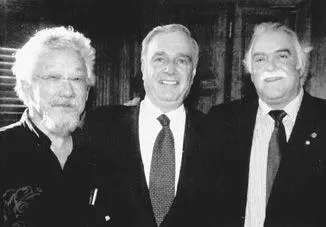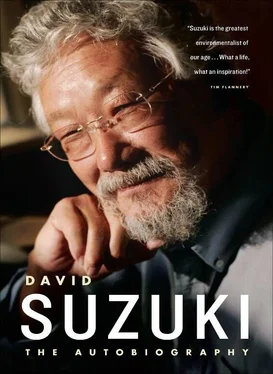Much later I spoke with Alex Frame, the executive producer of 0 Minutes Live , and he admitted it had been a mistake to stay so wedded to the prearranged schedule rather than let the energy of Leary, Vonnegut, and Suzuki carry on. The next day, Tara and I went out for breakfast with Vonnegut, who was charming and insisted on taking us to a bookstore to get one of his books. The salesperson did a double take when he recognized Vonnegut and could do nothing but stare when Vonnegut asked where his own books were. Eventually Vonnegut found the book he wanted and signed it, and it is one of our treasured possessions.
I appeared sporadically on Morningside . Peter was laid-back, but I was always wary, expecting some nasty question to come at me. It never did. He was a very generous interviewer, asking a question and then letting me have my say rather than cutting me off to shape the interview the way he wanted, as so many hosts do today. But if he was genuinely interested in what I said, I couldn't understand why he didn't go on to espouse environmental causes. I have always been surprised that hosts of programs may report on frightening or urgent stories, yet when the show is over, they move on to the next issue. It was one of the problems Jim Murray, my boss and best friend at The Nature of Things , had with me. Because of a program we did, say, on the Cree in Quebec, the Kaiapo in the Amazon, or the Haida in Haida Gwaii, I couldn't help but stay engaged with them. So when the program had been broadcast, I'd still be working away with them, whereas Jim felt I should move on and concentrate on the next show, which was a perfectly reasonable position from the standpoint of the series.
Writing about himself in 2001, Gzowski admitted in A Peter Gzowski Reader that he
had a pretty full life. On radio or television or with pencil in hand, I've got to meet the Queen, eight prime ministers (nine if you count Margaret Thatcher. .), four governors-general, two chief justices, two Nobel Prize winners, the world yodeling, whistling and bagpipe champions (all Canadians) and every winner and most of the runners up of the Giller Prize for Literature.
Gzowski was clearly proud of having interviewed so many important people — and he should have been. The range of people he had met and interviewed in a career spanning almost twenty years, for three hours a day, five days a week, must be mind-boggling. I always marveled at the sheer stamina and concentration needed for such a prodigious effort.

Jim Fulton and me presenting Prime Minister Paul Martin with our document “Sustainability Within A Generation” in 2004
But it's the list Gzowski chose to write down that interests me. All those prime ministers and the Queen and Giller Prize candidates and winners, yet a measly two Nobel Prize winners. I was surprised he even bothered to mention them, and he failed to indicate whether they were scientists, writers, economists, or peace workers. Lester Pearson, prime minister of Canada from 1963 to 1968, was the recipient of a Nobel Peace Prize in 1957, but there have been four other Nobel Prize winners in science who continued to stay in Canada — Frederick Banting, Gerhard Herzberg, John Polanyi, Mike Smith — and I interviewed three of them (Banting had died in 1941). There are usually about ten to twelve winners of the prestigious awards in three science categories every year. I was the host of Quirks and Quarks for four years, and during that time I interviewed at least twenty Nobel Prize winners. A huge divide remains between scientists and the rest of society, and the paucity of scientist Nobelists on Gzowski's list reflects it. How can we as a society assess the potential impact of so many issues in which science and technology play major roles in both their creation and solution if we ignore them?
Nothing illustrates the consequences of scientific illiteracy better than the situation in the United States. President George W. Bush received an education at Yale University, one of the top institutions in the world, and rose to head the wealthiest and most powerful nation in history. Yet the country founded on a separation of church and state has seen the intrusion of a Christian fundamentalism into the very center of power. One shocking consequence is the debate about evolution, which has flared into a national movement, putting enormous pressure on teachers and educational institutions to relegate evolution to a theory that must compete with the biblical version of Creation. Once called “scientific creationism,” this literal interpretation of the Bible has been modernized into Intelligent Design, with all the trappings and jargon of molecular biology. The fact that it continues to be considered a serious scientific alternative to evolution is a disgrace. Evolution is as real as the existence of an atom, DNA, or a black hole; we see it everywhere, not only in living systems, but in the geology of Earth and the dynamic universe. The mechanisms and processes of evolution are far from understood, but the fact of its occurrence is not. Scientists have failed to inculcate an understanding of what lies within the scientific realm and where religion intrudes without justification.
But President Bush's kind of faith in science and technology also enabled him to push an agenda of space travel to Mars within a decade or two. I have visited the Houston Space Center many times to film and have shot the mock-ups for the Mars trip. They are unbelievably crude, and I don't believe for a minute that getting to Mars and back will be possible within my children's lifetime, if ever; nor is the cost of trying worth it. It is a political gimmick, a proposal Bush will not have to be accountable for, merely a bauble offered to the electorate if it demonstrates leadership and vision.
Of a more serious nature is the proposal to build a space-based missile defense system reminiscent of Ronald Reagan's Strategic Defense Initiative, or Star Wars. Now deprived of an Evil Empire, the Soviet Union, to justify such a costly boondoggle, Bush is left pointing to an Axis of Evil that may include North Korea, Cuba, and who knows who else among this terrifying group — Libya's three million people? Grenada?
The dangers posed by nuclear-tipped missiles are their speed, accuracy, and destructive power. Armed with multiple, independently targeted warheads, such weapons might be loaded with reflective materials to confuse radar. A defence system would have to pick up a missile immediately after it is launched to maximize the time window in which to respond. Computers would have to identify the missile correctly and not mistake commercial planes, flocks of ducks, or UFOs for the missile. The trajectory, probable target, and payload would have to be analyzed very rapidly to respond in time to knock down the attacking vehicle before it reached the United States (chances are this scenario would be played out over Canada).
Now here's the rub. Someone — a human being — is going to have to recognize the implications of what the entire system has detected and spat out: namely, that one or dozens of missiles are headed to the United States. If I were going to launch such an attack, I would do it at an inconvenient hour, like 3:00 am on New Year's Day or after the Super Bowl. Some poor military person sitting in a silo somewhere in the Midwest, quietly playing a computer game or more likely napping, would have to notice what's going on and calmly assess the information and immediately pass it up the line. Assuming his or her superior was available, awake, and alert, he or she would have to assess the material and pass it on until eventually someone would have to go and wake the president so that he could push the red button or put in a key or whatever it takes to release the defensive weapons.
Читать дальше



![David Jagusson - Devot & Anal [Hardcore BDSM]](/books/485905/david-jagusson-devot-anal-hardcore-bdsm-thumb.webp)









